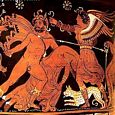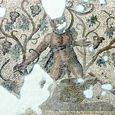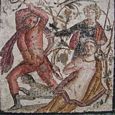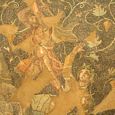LYKOURGOS
Greek Name
Λυκουργος
Transliteration
Lykourgos
Latin Spelling
Lycurgus
Translation
--
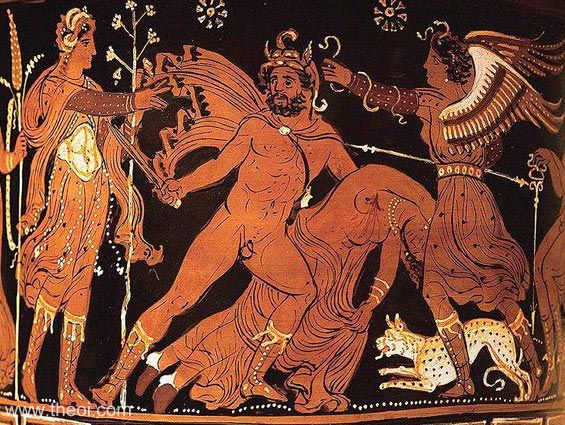
LYKOURGOS (Lycurgus) was an impious king of the Edonians of Thrake. He attacked Dionysos when the god was travelling through his land instructing men in the art of winemaking or--in another version of the tale--when the god was a child in the care of the Nymphs of Mount Nysa. As the divine troupe fled his assault, Lykourgos struck down Dionysos' nurse Ambrosia with an axe The rest of the company dived into the sea where they were given refuge by the goddess Thetis.
As punishment for his crime, Lykourgos was inflicted with madness and in this crazed state slew his wife and sons. His own death followed soon after:--some say he chopped off his own feet with an axe before killing himself; others that he was struck blind and being scorned by all died in destitution; or that he was torn apart by his own horses, devoured by the panthers of the god, or wrapped in strangling vines and sent to Haides for eternal torment.
Lykourgos' fate was not unique--Pentheus, Orpheus, the Proitides and the Minyades also suffered severe punishment for scorning the god.
FAMILY OF LYCURGUS
PARENTS
[1.1] DRYAS (Homer Iliad 6.129, Apollodorus 3.34, Hyginus Fabulae 132)
[2.1] BOREAS (Diodorus Siculus
5.50.2)
OFFSPRING
[1.1] ARDYS, ASTAKIOS (by Kytis) (Greek Papyri III No. 129)
ENCYCLOPEDIA
LYCURGUS (Lykourgos), a son of Dryas, and king of the Edones in Thrace. He is famous for his persecution of Dionysus and his worship on the sacred mountain of Nyseion in Thrace. The god himself leaped into the sea, where he was kindly received by Thetis. Zeus thereupon blinded the impious king, who died soon after, for he was hated by the immortal gods. (Hom. Il. vi. 130, &c.) The punishment of Lycurgus was represented in a painting in a temple at Athens. (Paus. i. 20. § 20.) The above Homeric story about Lycurgus has been much varied by later poets and mythographers. Some say that Lycurgus expelled Dionysus from his kingdom, and denied his divine power; but being intoxicated with wine, he first attempted to do violence to his own mother, and to destroy all the vines of his country. Dionysus then visited him with madness, in which he killed his wife and son, and cut off one (some say both) of his legs; or, according to others, made away with himself. (Hygin. Fab. 132, 242; Serv. ad Aen. iii. 14.) According to Apollodorus (iii. 5. § 1), Dionysus, on his expeditions, came to the kingdom of Lycurgus, but was expelled; where-upon he punished the king with madness, so that he killed his son Dryas, in the belief that he was cutting down a vine. When this was done, Lycurgus recovered his mind; but his country produced no fruit, and the oracle declared that fertility should not be restored unless Lycurgus were killed. The Edonians therefore tied him, and led him to mount Pangaeum, where he was torn to pieces by horses. Diodorus (i. 20, iii. 65) gives a sort of rationalistic account of the whole transaction. According to Sophocles (Antig. 955, &c.), Lycurgus was entombed in a rock. (Comp. Ov. Trist. v. 3, 39.)
Source: Dictionary of Greek and Roman Biography and Mythology.
CLASSICAL LITERATURE QUOTES
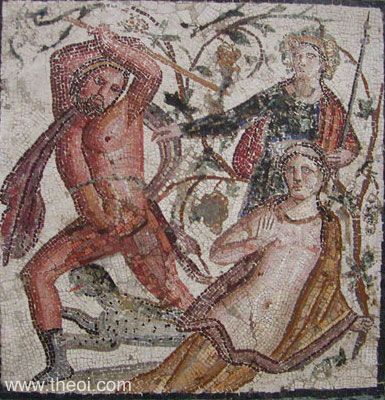
Homer, Iliad 6. 129 ff (trans. Lattimore) (Greek epic C8th B.C.) :
"I will not fight against any god of the heaven, since even the son of Dryas, Lykourgos (Lycurgus) the
powerful, did not live long; he who tried to fight with the gods of the bright sky, who once drove the fosterers
of rapturous (mainomenos) Dionysos headlong down the sacred Nyseian hill, and all of them shed and
scattered their wands on the ground, stricken with an ox-goad by murderous Lykourgos, while Dionysos in terror
dived into the salt surf, and Thetis took him to her bosom, frightened, with the strong shivers upon him at the
man's blustering. But the gods who live at their ease were angered with Lykourgos and the son [Zeus] of Kronos
struck him to blindness, nor did he live long afterwards, since he was hated by all the immortals."
Stesichorus, Fragment 234 (from Scholiast on Homer's Iliad) (trans. Campbell, Vol.
Greek Lyric III) (Greek lyric C7th to C6th B.C.) :
"When he [Dionysos] was pursued by Lykourgos (Lycurgus) and took refuge in the sea, Thetis gave him a
kindly welcome, and he gave her the amphora, Hephaistos' (Hephaestus') handiwork. She gave it to her son
[Akhilleus (Achilles)], so that when he died his bones might be put in it. The story is told by Stesikhoros
(Stesichorus)."
Aeschylus, The Edonians (lost play) (Greek tragedy C5th B.C.) :
Aeschylus dramatized the story of Lykourgos (Lycurgus) in a lost trilogy of plays, the first of which was titled
The Edonians.
Aeschylus, Fragment 28 Edonians (from Pseudo-Longinus, On the Sublime 15. 6) (trans.
Smyth) (Greek tragedy C5th B.C.) :
"Lo, the house [of Lykourgos (Lycurgus)] is frenzied with the god [Dionysos], the roof revels,
Bakkhante-like."
Aeschylus, The Youths (lost play) (Greek tragedy C5th B.C.) :
The Youths or Neaniskoi was the third play in Aeschylus' Lykourgos (Lycurgus) trilogy.
According to Smyth (L.C.L.) : "The Youths apparently has its name form the Edonians who celebrated
the worship of Dionysus that had gained admission into the kingdom of Lycurgus despite the opposition of that
prince."
Aeschylus, Lycurgus (lost play) (Greek tragedy C5th B.C.) :
The satyr-play which formed part of the Lycurgean trilogy.
Aeschylus, Fragment 56 Lycurgus (from Athenaeus, Deipnosophists 10. 67. 447C) (trans.
Smyth) (Greek tragedy C5th B.C.) :
"And after this he [Lykourgos (Lycurgus)] drank beer thinned by age, and made thereof loud boast [against
Dionysos] in the banquet-hall."
Aeschylus, Fragment 10 Bassarae (from Hephaestion, Handbook of Metres 13. 43)
:
"The bull [Dionysos] was like to butt the goat [Lykourgos (Lycurgus)] with his horns."
Pseudo-Apollodorus, Bibliotheca 3. 34 - 35 (trans. Aldrich) (Greek mythographer C2nd
A.D.) :
"[Dionysos] set out eagerly through Thrake (Thrace). Now Lykourgos (Lycurgus), son of Dryas and king of the
Edonians, who lived beside the Strymon River, was the first to show his hybris to Dionysos by expelling him.
Dionysos fled to the sea and took shelter with Nereus' daughter Thetis, but his Bakkhai were taken captive along
with the congregation of Satyroi (Satyrs) that accompanied him. Later on, the Bakkhai (Bacchae) were suddenly
set free, and Dionysos caused Lykourgos to go mad. In this state, thinking he was cutting a vine-branch,
Lykourgos killed his son Dryas by cutting off his arms and legs with an axe. Then he regained his senses. When
his land remained barren, the god [Apollon] made an oracular pronouncement to the effect that, if Lykourgos were
to die, there would again be fertile crops. When the Edonians heard this, they took Lykourgos to Mount Pangaion
(Pangaeum) and bound him, and there in accordance with the will of Dionysos, he was destroyed by his horses and
died."
Diodorus Siculus, Library of History 4. 3. 4 (trans. Oldfather) (Greek historian C1st
B.C.) :
"He [Dionysos] also punished here and there throughout all the inhabited world many men who were thought to
be impious, the most renowned among the number being Pentheus and Lykourgos (Lycurgus)."
Diodorus Siculus, Library of History 5. 50. 1 - 6 :
"Naxos. This island was first called Strongylê and its first settlers were men from Thrake (Thrace),
the reason for their coming being somewhat as follows.
The myth relates that two sons, Boutes (Butes) and Lykourgos (Lycurgus), were born to Boreas, but not by the
same mother; and Boutes, who was the younger, formed a plot against his brother, and on being discovered he
received no punishment from Lykourgos beyond that he was ordered by Lykourgos to gather ships and, together with
his accomplices in the plot, to see out another land in which to make his home.
Consequently Boutes, together with the Thrakians who were implicated with him, set forth, and making his way
through the islands of Kyklades (Cyclades) he seized the island of Strongylê, where he made his home and
proceeded to plunder many of those who sailed past the island. And since they had no women they sailed here and
there and seized them from the land.
Now some of the islands of the Kyklades had no inhabitants whatsoever and others were sparsely settled;
consequently they sailed further, and having been repulsed once from Euboia (Euboea), they sailed to Thessalia
(Thessaly), where Boutes and his companions, upon landing, came upon the female devotees of Dionysos as they
were celebrating the orgies of the god near Drios, as it is called, in Akhaia (Achaea) Phthiotis.
As Boutes and his companions rushed at the women, these threw away the sacred objects, and some of them fled for
safety to the sea, and others to the mountain called Drios; but Koronis, the myth continues, was seized by
Boutes and forced to lie with him. And she, in anger at the seizure and at the insolent treatment she had
received, called upon Dionysos to lend her his aid. And the god struck Boutes with madness, because of which he
lost his mind and, throwing himself into a well, met his death.
But the rest of the Thrakians seized some of the other women, the most renowned of whom were Iphimedeia, the
wife of Aloios (Aloeus), and Pankratis (Pancratis), her daughter, and taking these women along with them, they
sailed off to Strongylê. And in place of Boutes the Thrakians made Agassamenos king of the island, and to
him they united in marriage, Pankratis, the daughter of Aloios, who was a woman of surpassing beauty."
Pausanias, Description of Greece 1. 20. 2 (trans. Jones) (Greek travelogue C2nd A.D.)
:
"[In the temple of Dionysos at Athens :] There are paintings here . . . there are represented Pentheus and
Lykourgos (Lycurgus) paying the penalty of their insolence to Dionysos."
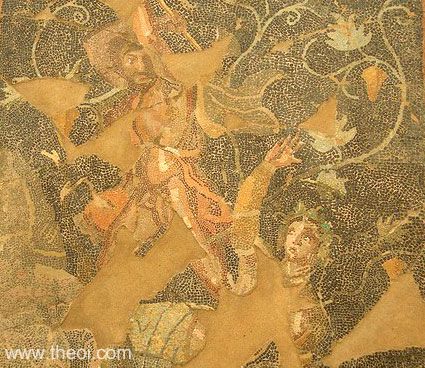
Anonymous, Dionysus and Lycurgus Fragment (trans. Page, Vol. Select Papyri III, No.
129) (Greek epic C3rd A.D.) :
[Fragment of a hymn to Dionysos. It begins with the countryside suddenly rendered waste and desert by the god.
Lykourgos is terrified. Dionysos appears and assails him with thunder and lightning. Mainades and Satyroi
assault his person, and Dionysos inflicts his soul with madness.]
". .(whence) the playful Saytroi (Satyrs) were born. Neither flowed the spring beside the elm, nor were
there ways of watering, nor paths nor fences nor trees, but all had vanished. Only the smooth plain appeared
again.
Where a meadow was before, close came Lykourgos (Lycurgus), heart-stricken with mighty fear and speechlessness.
For irresistibly, beyond mortal defence, all their works were upset and turned about before their eyes. But when
Lykourgos knew him for the glorious son of Zeus, pale terror fell upon his spirit; the ox-goad, wherewith he had
been at labour smiting, fell from his hand before his feet. He had no will to utter or to ask a word. Now might
that poor wretch have escaped his gloomy fate : but he besought not then the divinity to abate his wrath. In his
heart he foresaw that doom was nigh to him, when he saw Dionysos come to assail him amid lightnings that flashed
manifold with repeated thunderclaps, while Zeus did great honour to his son's destructive deeds.
So Dionysos urged his ministers, and they together sped against Lykourgos and scourged him with rods of foliage.
Unflinching he stood, like a rock that juts into the marble sea and groans when a wind arises and blows, and
abides the smiting of the seas : even so abode Lykourgos steadfast, and recked not of their smiting. But ever
more unceasing wrath went deep into the heart of Thyone's son : he was minded not at all to take his victim with
a sudden death, but rather to break him under a lengthy doom, that still alive he might repay a grievous
penalty. He sent madness upon him, and spread about the phantom shapes of serpents, that he might spend the time
fending them away, till baneful Rumour (phêmê) of his madness should arrive at Thebes on
wings and summon Ardys and Astakios (Astacius), his two sons, and Kytis (Cytis) who married him and was subdued
to his embrace.
They, when led by Rumour's (phêmê) many tongues they came, found Lykourgos just now
released from suffering, worn out by madness. They cast their arms around him as he lay in the dust--fools! they
were destined to perish at their father's hand before their mother's eyes! For not long after, madness, at the
command of Dionysos, aroused Lykourgos yet again with real frenzy. He thought that he was smiting serpents; but
they were his children form whom he stole the spirit forth. And now would Kytis have fallen about them : but in
compassion Dionysos snatched her forth and set her beyond the reach of doom, because she had warned her lord
constantly in his storms of evil passion. Yet she could not persuade her master, too stubborn; he, when his
sudden madness was undone, recognized the god through experience of suffering. Still Dionysos abated not his
wrath : as Lykourgos stood unflinching, yet frenzied by distress, the god spread vines about him and fettered
all his limbs. His neck and both ankles imprisoned, he suffered the most pitiable doom of all men on earth : and
now in the land of sinners his phantom endures that endless labour--drawing water into a broken pitcher : the
stream is poured forth into Haides.
Such is the penalty which the loud-thundering son of Kronos [Zeus] ordained for men that fight against the gods;
that retribution may pursue them both living and again in death . . "
Quintus Smyrnaeus, Fall of Troy 2. 433 ff (trans. Way) (Greek epic C4th A.D.)
:
"In her [Thetis'] bowers she sheltered Dionysos, chased by might of murderous Lykourgos (Lycurgus) from the
earth."
Pseudo-Hyginus, Fabulae 132 (trans. Grant) (Roman mythographer C2nd A.D.)
:
"Lycurgus, son of Dryas, drove Liber [Dionysos] from his kingdom. When he denied that Liber [Dionysos] was
a god, and had drunk wine, and in drunkenness tried to violate his mother, he then tried to cut down the vines,
because he said wine was a bad medicine in that it affected the mind. Under madness sent by Liber [Dionysos] he
killed his wife and son. Liber threw Lycurgus himself to his panthers on Rhodope, a mountain of Thrace, over
which he ruled. He is said to have cut off one foot thinking it was a vine."
Pseudo-Hyginus, Fabulae 192 :
"There are those who think they [i.e. the five Hyades] are among the stars because they were the nurses of
Father Liber [Dionysos] whom Lycurgus drove out from the island of Naxos."
Pseudo-Hyginus, Fabulae 242 :
"Men who committed suicide . . . Lycurgus, son of Dryas, killed himself in madness sent by Liber
[Dionysos]."
Pseudo-Hyginus, Astronomica 2. 21 :
"The Hyades. These, Pherecydes the Athenian [mythographer C5th B.C.] says, are the nurses of Liber
[Dionysos], seven in number, who earlier were nymphae called Dodonidae. Their names are as follows: Ambrosia,
Eudora, Pedile, Coronis, Polyxo, Phyto, and Thyone. They are said to have been put to flight by Lycurgus and all
except Ambrosia took refuge with Thetis, as Asclepiades [poet C3rd B.C.] says."
[N.B. In Greco-Roman mosaics Ambrosia is slain by Lykourgos (Lycurgus) with an axe.]
Ovid, Metamorphoses 4. 22 ff (trans. Melville) (Roman epic C1st B.C. to C1st A.D.)
:
"You, most worshipful [Dionysos], sent to their doom Lycurgus with his two-edged battleaxe, and Pentheus,
both blasphemers."
Ovid, Fasti 3. 720 ff (trans.Boyle) (Roman poetry C1st B.C. to C1st A.D.)
:
"It were long to relate the triumphs won by the god [Dionysos] over the Sithonians and the Scythians, and
how he subdued the peoples of India, that incense-bearing land. I will say naught of him [Pentheus] who fell a
mournful prey to his own Theban mother, nor of Lycurgus, whom frenzy drove to hack at his own son."
Ovid, Heroides 2. 111 ff (trans. Showerman) (Roman poetry C1st B.C. to C1st A.D.)
:
"The broad, broad realms of Lycurgus . . . where stretches icy Rhodope to Haemus with its shades, and
sacred Hebrus drives his headlong waters forth."
Virgil, Aeneid 3. 13 (trans. Fairclough) (Roman epic C1st B.C.) :
"At a distance lies the war god's land, of widespread plains, tilled by Thracians, and once ruled by fierce
Lycurgus."
Seneca, Hercules Furens 93 ff (trans. Miller) (Roman tragedy C1st A.D.) :
"[Dionysos] the tamer of Lycurgus and the ruddy sea [i.e. the Tyrrhenian pirates], who bears a spear-point
hidden beneath his vine-wreathed staff."
Seneca, Oedipus 469 ff :
"The Massgetan [a Thracian tribe] who mingles blood with milk in his goblets has unstrung his vanquished
bow and given up his Getan arrows; the realms of axe-wielding Lycurgus have felt the dominion of Bacchus
[Dionysos]; the fierce lands of the Zalaces have felt it, and those wandering tribes whom neighbouring Boreas
(the North Wind) smites."
Valerius Flaccus, Argonautica 1. 729 ff (trans. Mozley) (Roman epic C1st A.D.)
:
"Thyoneus [Dionysos] has turned his savage horns against the guilty Thracians, and now the mountains of
unhappy Haemus filled with madness a thousandfold, now the tall forests of Rhodope groan--such was Lycurgus
before whom wife and sons in flight speed down the long colonnades."
Statius, Thebaid 4. 54 ff (trans. Mozley) (Roman epic C1st A.D.) :
"The Stygian Eumenides [Erinyes] . . . dip their faces and the horned snakes that gasp from drinking
Phlegethon, whether they [the Erinyes] have ruined Thracian homes [i.e. the house of Lykourgos (Lycurgus)] or
Mycenae's impious palace or Cadmus' dwelling."
Statius, Thebaid 7. 180 ff :
"To Thrace and the forests of Lycurgus."
ANCIENT GREEK & ROMAN ART
SOURCES
GREEK
- Homer, The Iliad - Greek Epic C8th B.C.
- Greek Lyric III Stesichorus, Fragments - Greek Lyric C7th - 6th B.C.
- Aeschylus, Fragments - Greek Tragedy C5th B.C.
- Diodorus Siculus, The Library of History - Greek History C1st B.C.
- Pausanias, Description of Greece - Greek Travelogue C2nd A.D.
- Quintus Smyrnaeus, Fall of Troy - Greek Epic C4th A.D.
- Greek Papyri III Anonymous, Fragments - Greek Poetry C3rd A.D.
ROMAN
- Hyginus, Fabulae - Latin Mythography C2nd A.D.
- Hyginus, Astronomica - Latin Mythography C2nd A.D.
- Ovid, Metamorphoses - Latin Epic C1st B.C. - C1st A.D.
- Ovid, Fasti - Latin Poetry C1st B.C. - C1st A.D.
- Ovid, Heroides - Latin Poetry C1st B.C. - C1st A.D.
- Virgil, Aeneid - Latin Epic C1st B.C.
- Seneca, Hercules Furens - Latin Tragedy C1st A.D.
- Seneca, Oedipus - Latin Tragedy C1st A.D.
- Valerius Flaccus, The Argonautica - Latin Epic C1st A.D.
- Statius, Thebaid - Latin Epic C1st A.D.
OTHER SOURCES
Other references not currently quoted here: Diodorus Siculus 1.20 & 3.65, Nonnus Dionysiaca Bks 20 & 21, Scholiast on Homer's Iliad 6.129, Sophocles Antigone 955, Tzetzes on Lycophron 273, Servius on Virgil's Aeneid 3.14, First Vatican Mythographer 122.
BIBLIOGRAPHY
A complete bibliography of the translations quoted on this page.
